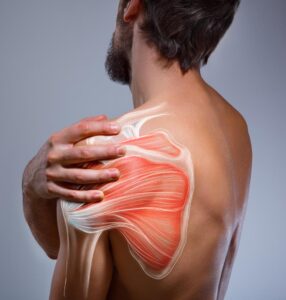Shoulder Trauma is injury which occurs to the shoulder frequently. The injuries might be anything from a split shoulder from a fall onto the shoulder to a high-speed car accident fracturing the collarbone or shoulder blade (clavicle). Everyone suffers from a shoulder injury at some point in their lives, that much is clear.
A shoulder fracture’s classification depends on the specific bone affected, like a fracture in the humerus.
There are three distinct bones that can experience a fracture:
Collarbone, or clavicle fracture
Upper arm bone, or humerus fracture
Shoulder blade, or scapula fracture

Overview:
What is Shoulder trauma?
Shoulder trauma are basically shoulder injuries are frequent, varying from a separated shoulder due to a fall onto it, to fractures of the shoulder blade or collarbone from a high-speed car accident.
Causes & Symptoms
Causes
What leads to shoulder trauma?
Shoulder trauma typically results from sudden, forceful impacts, often due to:
- Sporting accidents.
- Slips or trips.
- Motor vehicle collisions.
Symptoms
Fracture symptoms in the shoulder vary depending on the type:
Common Signs are:
- Stiffness
- Discomfort
- Swelling and bruising
- Difficulty moving the shoulder
- Grinding sensation (crepitus) during movement
- Altered appearance – “It appears abnormal”.
What complications may arise?
Many individuals with a shoulder fracture may suffer from persistent joint stiffness post-healing. Additionally, there’s a heightened risk of arthritis development in the affected shoulder.
Open fractures (where the bone breaks through the skin) elevate the risk of bone infections (osteomyelitis).
Although uncommon, the initial injury causing a fracture may also harm other shoulder components, such as muscles, ligaments, tendons, nerves, and blood vessels.
Common Injuries Causing Shoulder Trauma
Various shoulder injuries include:
- Sprains and strains: Result from ligament or muscle/tendon stretching or tearing due to falls or sudden arm twists.
- Dislocations: Bones forced out of position, usually from falls or blows during contact sports.
- Tendinitis: Inflammation of tendons from injury or overuse.
- Bursitis: Inflammation of the protective bursa due to chronic overuse, injury, or conditions like arthritis, gout, or infection.
- Rotator cuff injury: Involves tendons and muscles holding the shoulder joint bones together, often leading to decreased range of motion.
- Fractures: Bone breaks due to falls or direct shoulder impacts.
- Arthritis: Osteoarthritis, characterized by cartilage wearing away in the joint, is the most common type of shoulder arthritis.
Diagnosis and Tests:
To assess shoulder trauma, orthopedic doctor, Dr. Preetesh Choudhary, will likely undergo one or more imaging procedures:
- X-rays: These confirm fractures and assess bone damage extent.
- Magnetic resonance imaging (MRI): Offers a comprehensive view of bone damage and surrounding tissues, including cartilage and ligaments.
- Computed tomography (CT) scan: Provides a detailed image of bones and surrounding tissue, surpassing X-rays in clarity.
Treatments
Shoulder Trauma Treatments
Swift intervention is crucial to avoid severe shoulder damage. Initial treatment typically involves RICE (rest, ice, compression, elevation) and anti-inflammatory medication to alleviate swelling and pain.
Orthopedic Doctor in Indore, Dr. Preetesh Choudhary, MLs Clinic might suggest exercises to strengthen shoulder muscles and restore mobility.